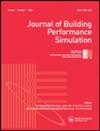Rooftop unit comparison calculator: a framework for comparing performance of rooftop units with building energy simulation
IF 2.3
4区 工程技术
Q2 CONSTRUCTION & BUILDING TECHNOLOGY
引用次数: 0
Abstract
AbstractThe applications of building energy simulation (BES) in designing heating, ventilation, and air conditioning (HVAC) systems are limited by the high costs of developing simulation models and the lack of references for determining the model parameters. This paper presents a software framework for selecting designs for rooftop unit HVAC (RTU) systems with BES. Specifically, this framework reduces the cost of using BES by automating the generation of EnergyPlus models. It also employs a systematic method for determining model parameters based on well-accepted datasets. We applied this framework in a comprehensive assessment of an advanced design of RTU systems in which 478 EnergyPlus models were developed without human involvement. The assessment reveals that replacing a constant-speed fan/coil with a multiple-speed fan/coil may not guarantee better overall performance. It also suggests the benefits of replacing furnace coils with heat pumps are subject to utility cost, weather conditions, and heating load profiles.KEYWORDS: Building energy simulationEnergyPlusHVAC system designModel parametersRooftop unitSimulation workflow Disclosure statementNo potential conflict of interest was reported by the author(s).Data availability statementDerived data supporting the findings of this study are available from the corresponding author on request.Notes1 This work was supported by the US DOE Office of Energy Efficiency and Renewable Energy, Building Technologies Office. This manuscript has been authored by UT-Battelle, LLC, under contract DE-AC05-00OR22725 with the US Department of Energy (DOE). The US government retains and the publisher, by accepting the article for publication, acknowledges that the US government retains a nonexclusive, paid-up, irrevocable, worldwide license to publish or reproduce the published form of this manuscript, or allow others to do so, for US government purposes. DOE will provide public access to these results of federally sponsored research in accordance with the DOE Public Access Plan (https://www.energy.gov/doe-public-access-plan).2 https://rtucc.pnnl.gov/#/屋顶单元比较计算器:用于比较屋顶单元性能与建筑能源模拟的框架
摘要建筑能耗仿真(BES)在暖通空调系统设计中的应用受到开发仿真模型成本高和模型参数确定缺乏参考资料的限制。本文提出了一种基于BES的屋顶机组暖通空调(RTU)系统设计选择的软件框架。具体来说,该框架通过自动生成EnergyPlus模型,降低了使用BES的成本。它还采用了一种基于公认数据集的系统方法来确定模型参数。我们将这一框架应用于RTU系统的先进设计的综合评估,其中478个EnergyPlus模型是在没有人工参与的情况下开发的。评估显示,将恒速风扇/盘管替换为多速风扇/盘管可能无法保证更好的整体性能。它还表明,用热泵代替炉盘管的好处取决于公用事业成本、天气条件和热负荷概况。关键词:建筑能源仿真;能源+暖通空调系统设计;模型参数;屋顶单元;仿真工作流程;数据可用性声明支持本研究结果的衍生数据可应要求从通讯作者处获得。注1本工作得到了美国能源部能源效率和可再生能源办公室、建筑技术办公室的支持。本文由UT-Battelle, LLC根据与美国能源部(DOE)签订的DE-AC05-00OR22725合同撰写。美国政府保留和出版商,通过接受文章的出版,承认美国政府保留非排他性的,付费的,不可撤销的,全球许可,以出版或复制该手稿的出版形式,或允许其他人这样做,为美国政府的目的。美国能源部将根据美国能源部公共访问计划(https://www.energy.gov/doe-public-access-plan).2 https://rtucc.pnnl.gov/#/)向公众提供这些由联邦政府资助的研究成果
本文章由计算机程序翻译,如有差异,请以英文原文为准。
求助全文
约1分钟内获得全文
求助全文
来源期刊

Journal of Building Performance Simulation
CONSTRUCTION & BUILDING TECHNOLOGY-
CiteScore
5.50
自引率
12.00%
发文量
55
审稿时长
12 months
期刊介绍:
The Journal of Building Performance Simulation (JBPS) aims to make a substantial and lasting contribution to the international building community by supporting our authors and the high-quality, original research they submit. The journal also offers a forum for original review papers and researched case studies
We welcome building performance simulation contributions that explore the following topics related to buildings and communities:
-Theoretical aspects related to modelling and simulating the physical processes (thermal, air flow, moisture, lighting, acoustics).
-Theoretical aspects related to modelling and simulating conventional and innovative energy conversion, storage, distribution, and control systems.
-Theoretical aspects related to occupants, weather data, and other boundary conditions.
-Methods and algorithms for optimizing the performance of buildings and communities and the systems which service them, including interaction with the electrical grid.
-Uncertainty, sensitivity analysis, and calibration.
-Methods and algorithms for validating models and for verifying solution methods and tools.
-Development and validation of controls-oriented models that are appropriate for model predictive control and/or automated fault detection and diagnostics.
-Techniques for educating and training tool users.
-Software development techniques and interoperability issues with direct applicability to building performance simulation.
-Case studies involving the application of building performance simulation for any stage of the design, construction, commissioning, operation, or management of buildings and the systems which service them are welcomed if they include validation or aspects that make a novel contribution to the knowledge base.
 求助内容:
求助内容: 应助结果提醒方式:
应助结果提醒方式:


